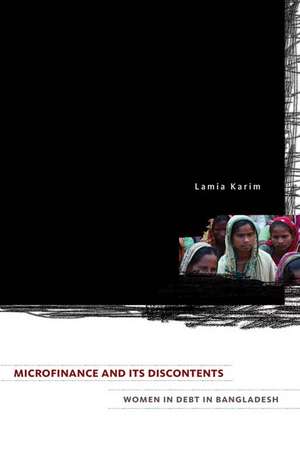Microfinance and Its Discontents: Women in Debt in Bangladesh
Autor Lamia Karimen Limba Engleză Paperback – 7 mar 2011
A feminist critique of the much-lauded microcredit process in Bangladesh
In 2006 the Grameen Bank of Bangladesh won the Nobel Peace Prize for its innovative microfinancing operations. This path-breaking study of gender, grassroots globalization, and neoliberalism in Bangladesh looks critically at the Grameen Bank and three of the leading NGOs in the country. Amid euphoria over the benefits of microfinance, Lamia Karim offers a timely and sobering perspective on the practical, and possibly detrimental, realities for poor women inducted into microfinance operations.
In 2006 the Grameen Bank of Bangladesh won the Nobel Peace Prize for its innovative microfinancing operations. This path-breaking study of gender, grassroots globalization, and neoliberalism in Bangladesh looks critically at the Grameen Bank and three of the leading NGOs in the country. Amid euphoria over the benefits of microfinance, Lamia Karim offers a timely and sobering perspective on the practical, and possibly detrimental, realities for poor women inducted into microfinance operations.
In a series of ethnographic cases, Karim shows how NGOs use social codes of honor and shame to shape the conduct of women and to further an agenda of capitalist expansion. These unwritten policies subordinate poor women to multiple levels of debt that often lead to increased violence at the household and community levels, thereby weakening women’s ability to resist the onslaught of market forces.
A compelling critique of the relationship between powerful NGOs and the financially strapped women beholden to them for capital, this book cautions us to be vigilant about the social realities within which women and loans circulate—realities that often have adverse effects on the lives of the very women these operations are meant to help.
Preț: 222.01 lei
Nou
Puncte Express: 333
Preț estimativ în valută:
42.48€ • 46.29$ • 35.80£
42.48€ • 46.29$ • 35.80£
Carte tipărită la comandă
Livrare economică 23 aprilie-07 mai
Preluare comenzi: 021 569.72.76
Specificații
ISBN-13: 9780816670956
ISBN-10: 0816670951
Pagini: 296
Ilustrații: 22
Dimensiuni: 140 x 216 x 20 mm
Greutate: 0.36 kg
Ediția:1
Editura: University of Minnesota Press
Colecția Univ Of Minnesota Press
ISBN-10: 0816670951
Pagini: 296
Ilustrații: 22
Dimensiuni: 140 x 216 x 20 mm
Greutate: 0.36 kg
Ediția:1
Editura: University of Minnesota Press
Colecția Univ Of Minnesota Press
Notă biografică
Lamia Karim is associate professor of cultural anthropology at the University of Oregon, Eugene.
Cuprins
Preface
Abbreviations
Introduction: Neoliberalism, Microfinance, and Women’s Empowerment
1. The Structural Transformation of the NGO Sphere
2. The Research Terrain
3. The Everyday Mediations of Microfinance
4. The Social Life of Debt
5. NGOs, Clergy, and Contested “Democracy”
6. Power/Knowledge in Microfinance
Conclusion: From Disciplined Subjects to Political Agents?
Glossary of Bengali Words
Notes
Index
Abbreviations
Introduction: Neoliberalism, Microfinance, and Women’s Empowerment
1. The Structural Transformation of the NGO Sphere
2. The Research Terrain
3. The Everyday Mediations of Microfinance
4. The Social Life of Debt
5. NGOs, Clergy, and Contested “Democracy”
6. Power/Knowledge in Microfinance
Conclusion: From Disciplined Subjects to Political Agents?
Glossary of Bengali Words
Notes
Index
Recenzii
"It is precisely because the microcredit mantra has been so endlessly repeated, often in place of actual empirical documentation to back its claims, that Microfinance and Its Discontents is so compelling. This is an outstanding, courageous, and path-breaking piece of scholarship; one that will doubtless unsettle the microcredit establishment, and by extension, key presumptions of neoliberal research agendas." —Kamala Visweswaran, University of Texas, Austin
"Lamia Karim has done an excellent job by juxtaposing facts against myths, lies against truths and objective research against subjective hagiographies [...] I believe this book is an important addendum to the growing literature that demonstrates and deconstructs the lies and myths about microcredit and NGO business in Bangladesh and elsewhere in the Third World." —countercurrents.org
"Karim's book is a timely contribution to the debate on microfinance, and is a challenging and engaging read for the specialist as well as the lay reader. I believe that her ideas will serve as a guideline for future researchers’ and policy-makers inquiries into the gender aspect of microfinance." —Soumya Mishra, Governance across Borders
"Karim’s book serves as a stark and timely reminder of the value of ethnographic research in offering a deeper understanding of how developmental interventions in specific institutional and local contexts may reproduce or even exacerbate structural inequalities, and also in informing the strategies that seek to counter these inequalities." —Economic Political Weekly
"Lamia Karim has done an excellent job by juxtaposing facts against myths, lies against truths and objective research against subjective hagiographies [...] I believe this book is an important addendum to the growing literature that demonstrates and deconstructs the lies and myths about microcredit and NGO business in Bangladesh and elsewhere in the Third World." —countercurrents.org
"Karim's book is a timely contribution to the debate on microfinance, and is a challenging and engaging read for the specialist as well as the lay reader. I believe that her ideas will serve as a guideline for future researchers’ and policy-makers inquiries into the gender aspect of microfinance." —Soumya Mishra, Governance across Borders
"Karim’s book serves as a stark and timely reminder of the value of ethnographic research in offering a deeper understanding of how developmental interventions in specific institutional and local contexts may reproduce or even exacerbate structural inequalities, and also in informing the strategies that seek to counter these inequalities." —Economic Political Weekly
Descriere
The first feminist critique of the much-lauded microcredit process in Bangladesh.
